Intel’s 11th Gen Core “Rocket Lake” family of desktop processors is the final stepping stone before Intel moves to their 10nm Superfin process in totality. We say ‘in totality’ because the 11th Gen Core desktop processors include both 14nm and 10nm based processors. More on this later. Intel has another launch planned for the August-September release window, for their 12th Gen Alder Lake desktop processors which will all be 10nm processors. The 11th Gen is basically using the design and improvements meant for 12th Gen built on the 14nm process node because the matured 14nm process allows Intel to scale frequencies much higher that what they can on the 10nm process. What does that mean for the 11th Gen processors? A few hiccups. Aside from that, Intel has new features such as Intel Adaptive Boost Technology.
Intel has also come out with the new Z590, B560 and H510 platforms which are also compatible with their older 10th Gen Comet Lake processors. The Z590 chipset, in particular, supports four additional DMI 3.0 lanes, support for PCI Express Gen 4.0, additional USB 10 Gbps ports, USB 20 Gbps ports, Thunderbolt 4.0 and support for discrete Wi-Fi 6E. After AMD’s X570 and B550 chipsets, these would be the only Intel chipsets to support PCIe Gen 4.0. An easy way to remember is to think of all 500-series chipsets as PCIe Gen 4.0 compatible. With a few exceptions, of course.
Intel 11th Gen Core Rocket Lake processor specifications
The ‘Rocket Lake’ desktop processors have Core i5, i7 and i9 series. There are no Core i3 processors, as of now. Given that 12th Gen Alder Lake processors are around the corner, we aren’t so sure if Intel even needs to release the Core i3 processors. But if plenty of units are binned, then we might see them. Our bet is that we won’t. Coming back to the 11th Gen family. The Core i5 series is the biggest portfolio we’ve seen at launch with nine processors in total, followed by four Core i7 processors and five Core i9 processors.
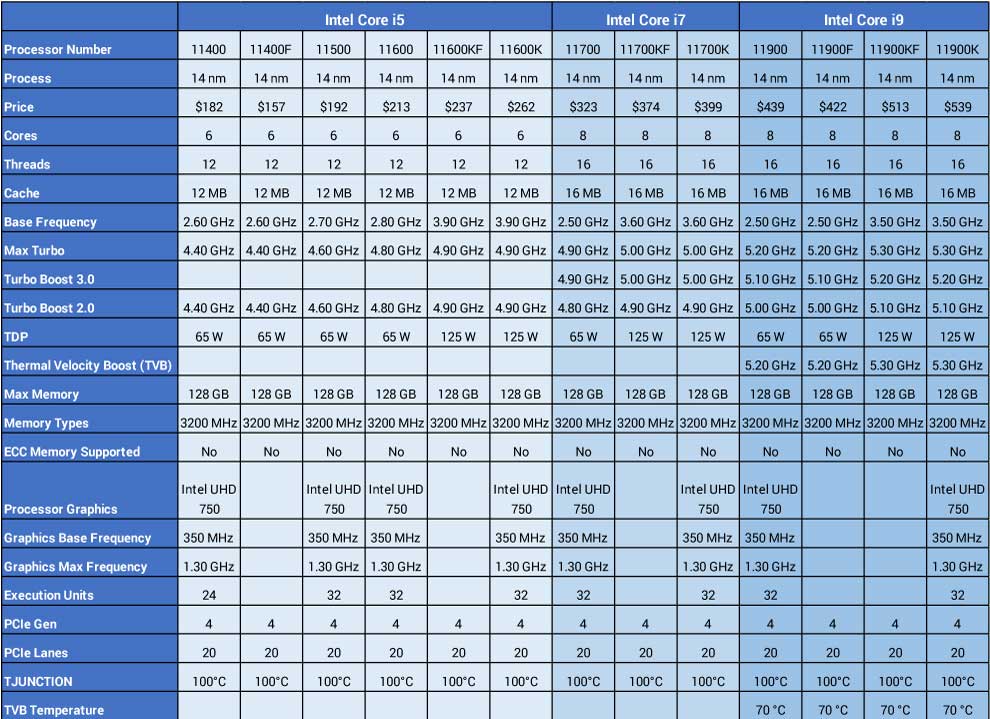
The Core i5 processors all have 6 cores, and the Core i7 and Core i9 series both have 8 cores. All the processors have multithreading, and you can thank AMD for that. Even though AMD has started releasing processors without multithreading in their 3000-series Ryzen processors. Now that both Core i7 and Core i9 processors have the same 8 cores, what sets them apart? Thermal Velocity Boost (TVB). It was launched with the Intel 10th Gen Comet Lake processors and provides an additional 100 MHz Turbo frequency when the temperature is below 70 degrees celsius. 70 degrees may seem like a conservative limit which would allow TVB to kick in regularly, but that’s not usually the case. You will need a really good CPU cooler and much lower ambient temperatures than what we experience in India. What’s more interesting is the new Intel Adaptive Boost Technology which increases the Turbo Boost Frequency across all cores when three or more cores are active. We take a look at this in much more detail later.
Lastly, there’s the fact that the 11th Gen Core family consists of both 14nm and 10nm processors. The latter was recently released with the ‘B’ suffix. The ‘B’ stands for BGA because these new processors were released for certain OEMs which had requirements for small form-factor machines. Even though these new ‘B’ processors are part of the 11th Gen Core family, they’re actually Tiger Lake. So all the 10nm 11th Gen Processors are Tiger Lake whereas all the 14nm 11th Gen Processors are Rocket Lake.
Intel Core i9-11900K and Core i5-11600K Performance
Power usage has started going up across all the new desktop components coming out of late. Intel has new boosting technologies and they’ve been jacking up the TDP to compete with AMD, who on the other hand, have been pushing core counts to ridiculous levels. NVIDIA’s new GPUs with hardware-accelerated ray-tracing have also started consuming ridiculous levels of power. For the consumer, we need to switch to higher wattage power supplies to take advantage of the new frequency boosting technologies and allow headroom for bursty workloads. We found out about this the hard way as the combined power consumption of both can spike up to 650 watts and take out a power supply. Thankfully, we managed to get a 1200W replacement after a while and repeat the benchmarking. We tested both, the top of the line Core i9-11900K and the mid-range Core i5-11600K.
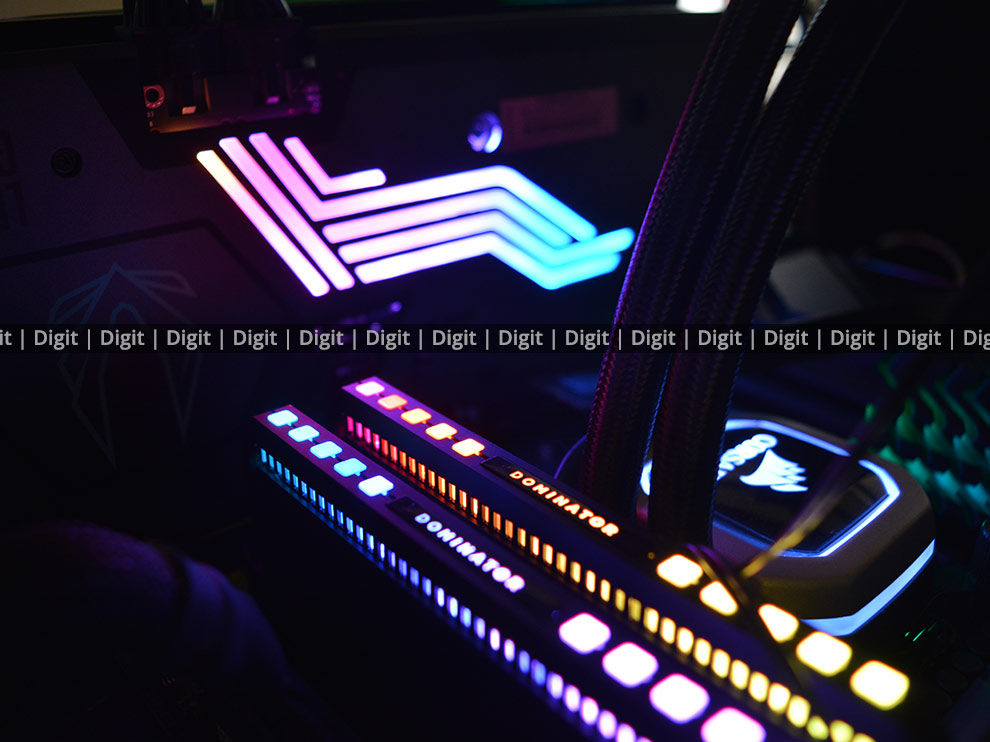
We tested the unit on the following configuration:
Intel 11th Gen Test Rig
CPU: Intel Core i9-11900K and Core i5-11600K
Motherboard: ASUS ROG MAXIMUS XIII HERO
SSD: 2x WD Black SN850 1TB
HDD: Seagate FireCuda 2 TB ST2000DX002
RAM: Corsair DOMINATOR PLATINUM RGB 32GB (2 x 16GB) @3200 MHz
Cooler: Corsair H115i Pro
PSU: Corsair HX1050 and Cooler Master V1200
Cinebench
As always, we begin with Cinebench R20 to see how the processor fares in single threaded and multithreaded performance. Cinebench is often used by both Intel and AMD to showcase the impact of IPC improvements across generations. It renders a 3D scene and is based on Maxon’s Cinema4D, an animation, VFX and motion design software.
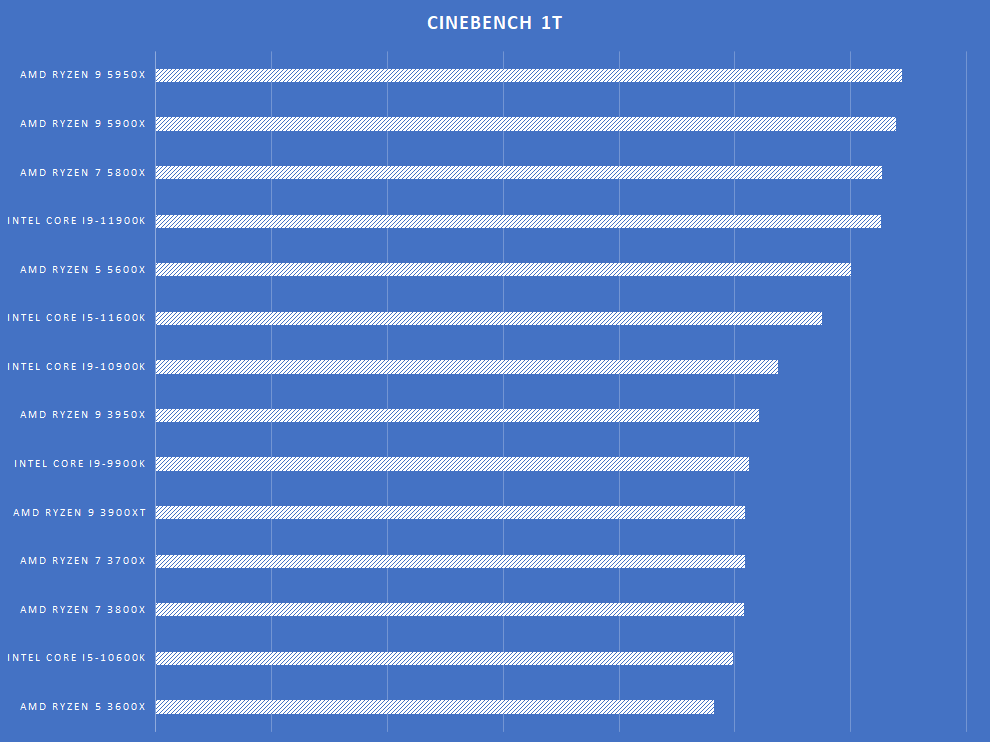
In the single-threaded benchmark, the Intel Core i9-11900K scores 626 points which is a considerable improvement over the previous gen Intel Core i9-10900K and puts Intel in the 600 point club. The AMD Ryzen 9 5950X is still ahead by a few points so AMD still retains the single-threaded performance lead.
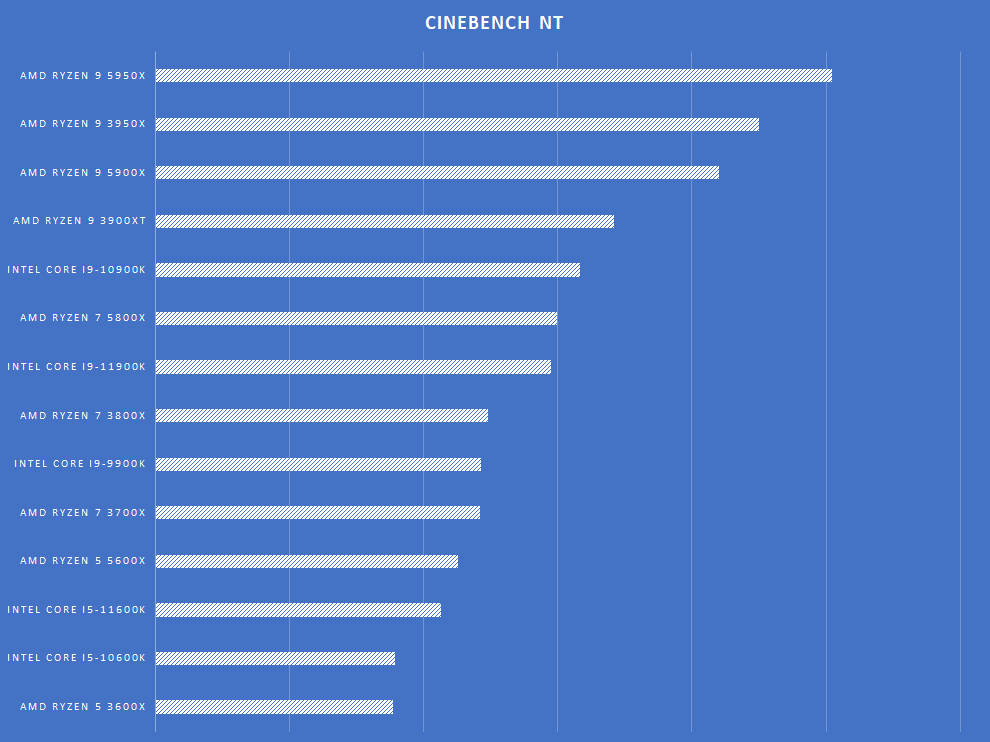
The results of the multi-threaded run aren’t surprising. Going from 10 cores in 10th Gen to 8 cores in 11th Gen does drop the performance of the 11900K below that of the 10900K. The AMD Ryzen 9 5950X, and 5900X are still ahead but the Ryzen 8 5800X is very close to the 11900K. The single-threaded performance improvement is certainly exciting and we hope Alder Lake can work magic provided Intel can get the frequency to scale well on 10nm.
POV-Ray
POV-Ray is another 3D rendering benchmark focused on ray-tracing. It’s not based on Microsoft’s DXR but it has optimisations for both Intel and AMD processors. The benchmark scales well across multiple cores and is also great for showing generational performance improvements.
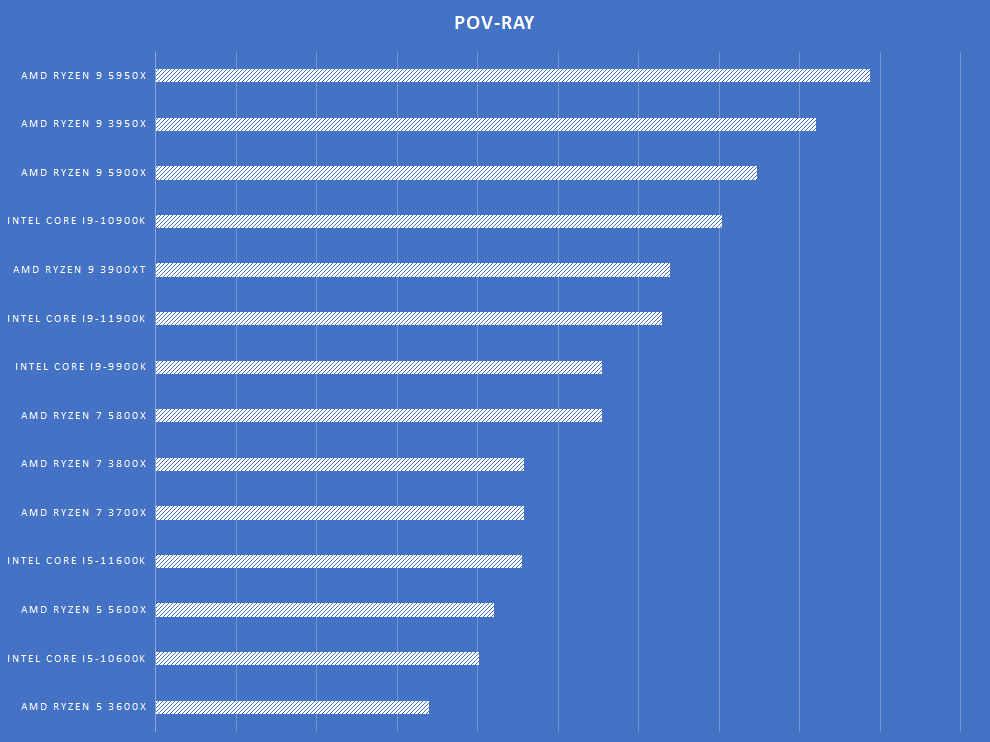
Being a multi-threaded benchmark, the 11900K falls behind the 10900K and all the higher core count AMD Ryzen 9 processors. Whereas, the Core i5-11600K does better than the Ryzen 5 5600X.
Handbrake
Our Handbrake run basically consists of transcoding a 4K video clip from one CODEC to another while downscaling the resolution. In particular, we use a large HEVC source file and transcode it into a 1080p H.264 file. The larger duration helps average out the transcoding performance and Handbrake makes use of all the cores that it can get its hands on.
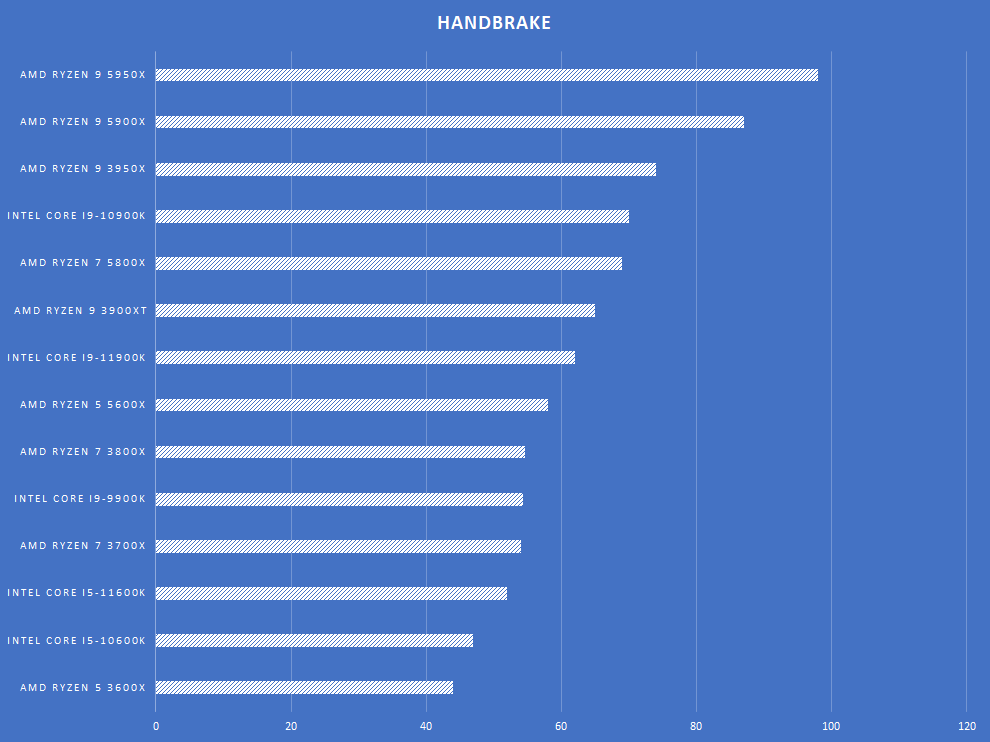
Handbrake benefits from both, high core count as well as high IPC. We track the average number of frames processed per second. This puts the 11900K behind the 10900K again showing that the additional IPC performance does not compensate for the reduced core count. The 11600K is better than the 10600K but the Ryzen 5 5600X is still ahead.
Blender
Blender is a fairly well known open-source rendering software used by movie studios as well as by game developers. There are standard benchmarking scenes on Blender and we use multiple iterations of the Classroom scene for our tests.
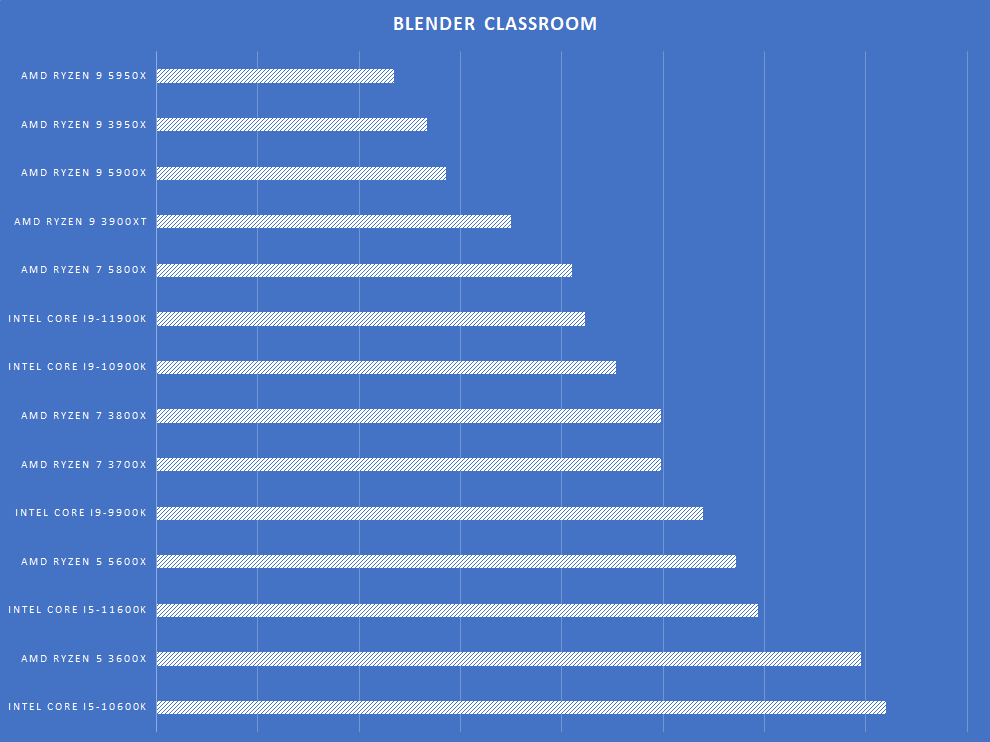
While one might wonder, why are we focused on so many 3D rendering applications in our benchmarks, the result of the Blender run should give you a clear answer. This is the one rendering benchmark in which the 11900K scores higher than the 10900K. The AMD Ryzen 9 5950X and 5900X are still higher and the Ryzen 7 5800X barely edges ahead. The Core i5-11600K falls behind the Ryzen 5 5600X by a narrow margin. Nevertheless, the algorithms used by Blender clearly favour the improvements brought in the 11th Gen processors.
7-Zip
7-Zip is an open-source archiving software with really good and frequently updated algorithms that perform compression and decompression. It’s the frequent updates that make 7-Zip a good benchmark. It also scales well with higher core-counts so there’s an added advantage with 7-Zip over other archiving software.
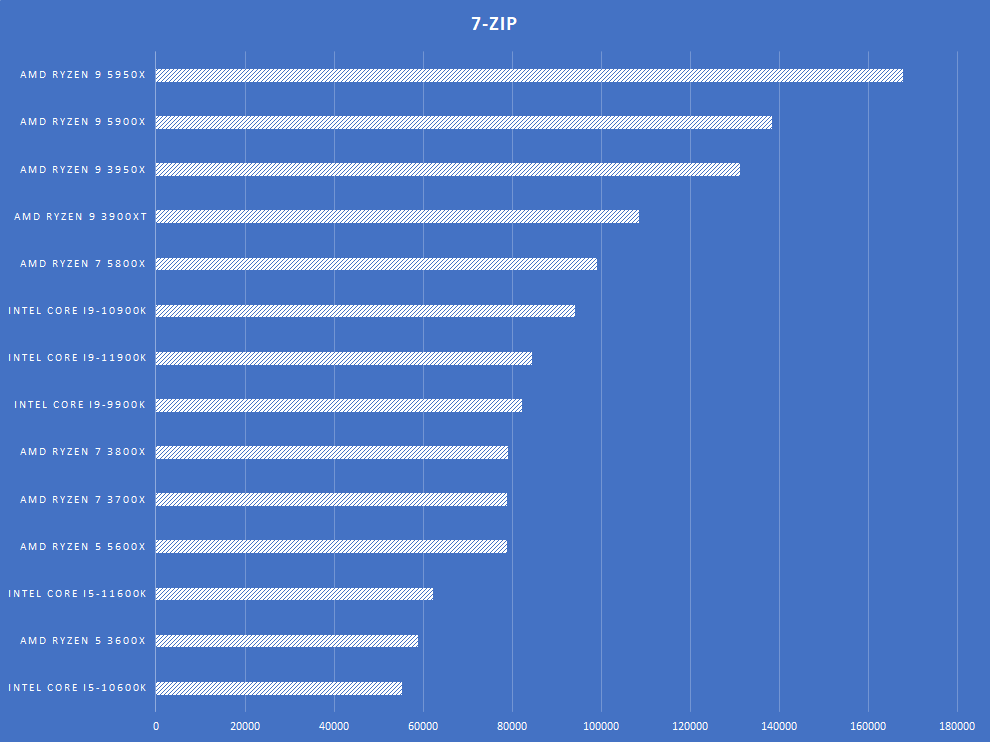
We see that 7-Zip favours AMD’s Zen 3 processors over the Intel 11th Gen processors. The scores seem similar to the other rendering benchmarks in our suite. So the 11900K falls behind the 10900K but the 11600K comes ahead of the 10600K. So core-for-core, the 11th Gen processors do show improvement but the lower core-count continues to be a handicap.
Mozilla Kraken
Mozilla Kraken is a browser-based JavaScript benchmark that executes several real-world scenarios that everyone comes across while normally browsing the Internet. It includes a host of different use cases such as searching, audio processing, image filtering, cryptography and JSON parsing.
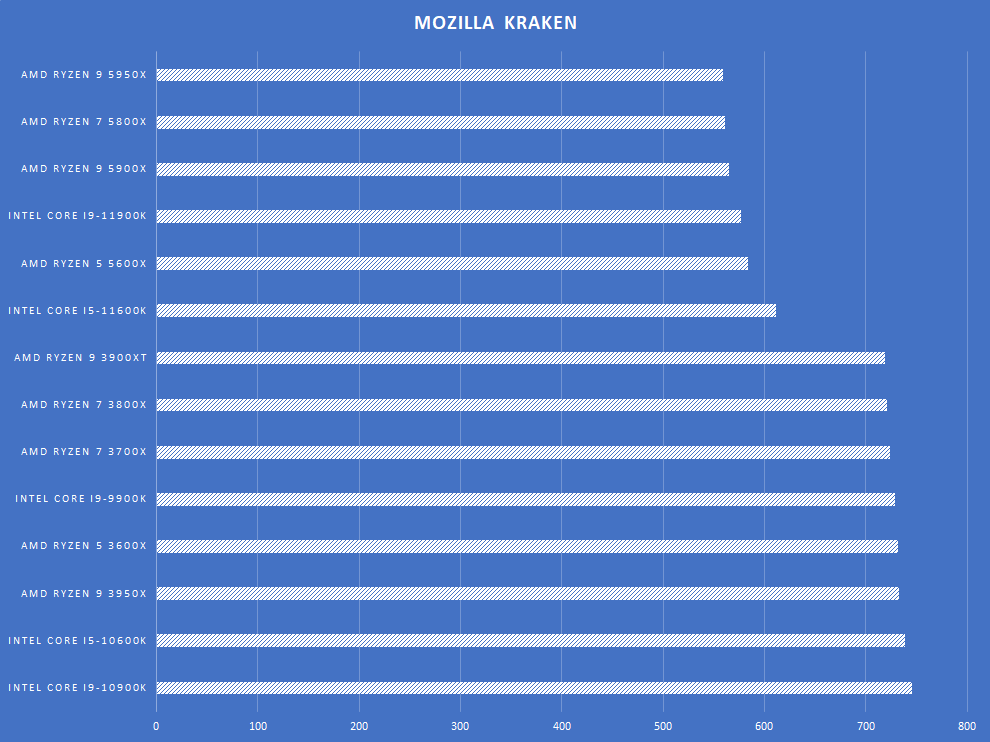
The Intel Core i9-11900K shows a marked improvement over the 10th gen 10900K. And the same goes for the 11600K which is also showing a decent improvement of the 10600K. The AMD processors are still ahead.
Gaming (Discrete GPU)
In our gaming benchmarks, we run several new titles on the NVIDIA RTX 2080 Ti. There are a host of different games based on a variety of current gen game engines using different graphics APIs such as DirectX11, 12, Vulkan and OpenGL.
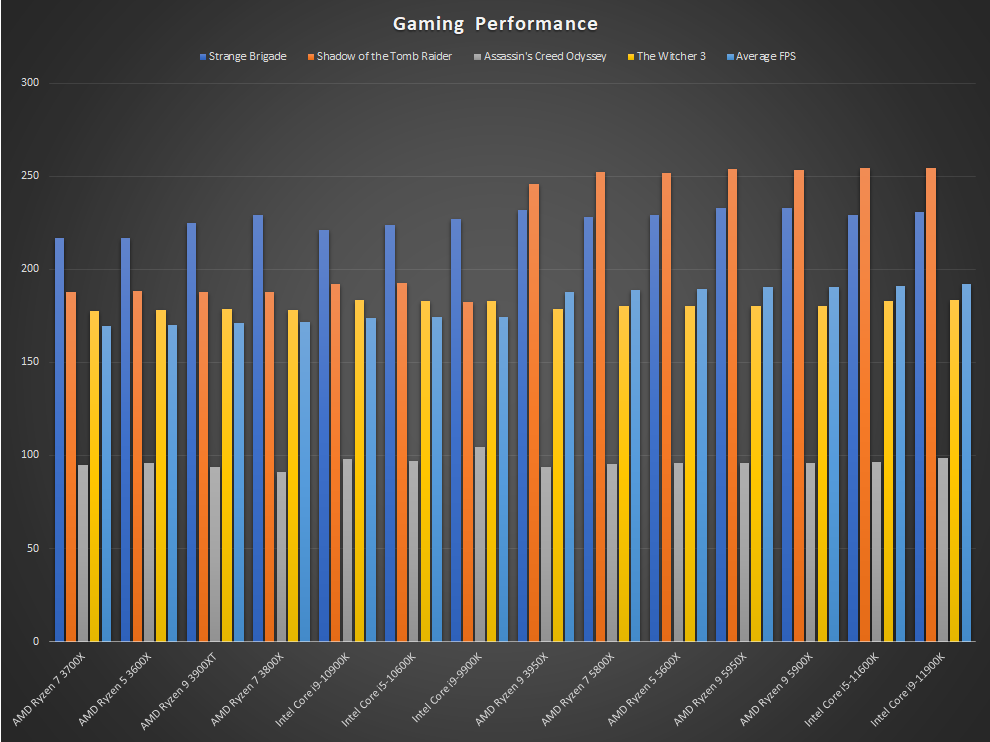
The scores here are for Shadow of the Tomb Raider, The Witcher 3, Assassin’s Creed Odyssey and Strange Brigade. We’ve also averaged the FPS scores across the games and included that in the graph. We can clearly see that Intel is still the best for gaming with the 11900K leading the pack followed closely by the 11600K. The AMD processors come next followed by Intel’s 9th Gen and 10th Gen processors.
Intel Xe-LP iGPU performance
One of the major improvements with the Intel 11th Gen processors is the Integrated GPU which has been overhauled altogether. The Intel Xe-LP is just a teaser of what Intel has planned for their upcoming discrete graphics cards. We ran 3DMark Night Raid to compare the Intel UHD 650 on the 10900K against the Intel UHD 750 on the 11900K which is based on Xe-LP.
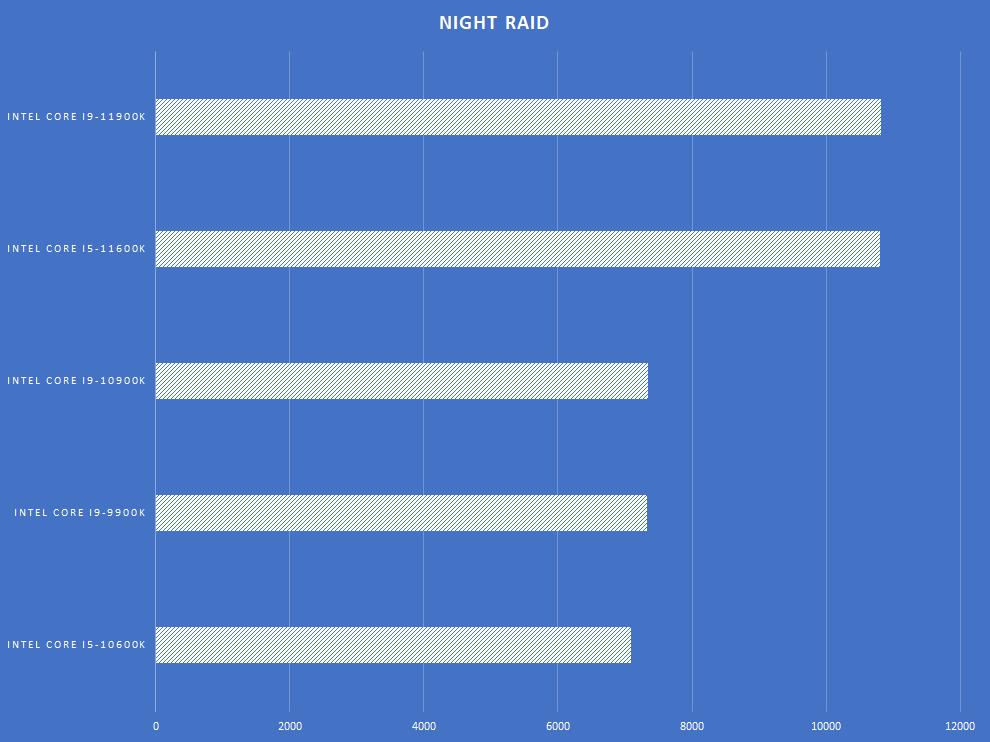
We see a 47 per cent improvement with the Intel Xe-LP over the older Intel Iris integrated graphics. If Intel had released Core i3 processors with Xe-LP graphics, then we’d have a great value offering in the entry-level segment. Compared to the AMD Ryzen 3 3200G, the Xe-LP with 32 EUs would be an improvement but compared to the AMD Ryzen 5 3400G, the Xe-LP would still lag behind.
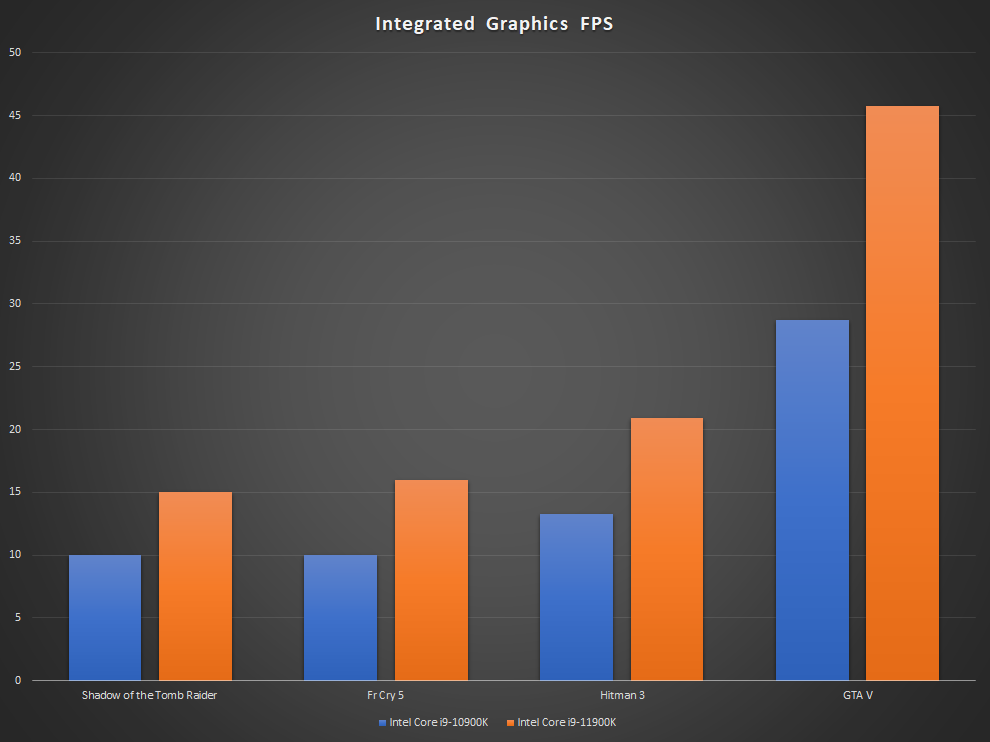
Running games on the iGPU also shows that we’re seeing a similar 50 to 60 per cent improvement in average FPS. Unfortunately, current-gen AAA games aren’t playable which is normal for all iGPUs but older AAA titles such as GTA V are playable on low settings.
Generational performance improvement
We didn’t get the Core i7 processors from the 11th Gen or the 10th Gen from Intel. Also, the core counts for Core i9 processors are different between 10th and 11th Gen. So the only Core-to-Core comparison that we can run is with the Core i5 processors.

We’ve charted all the benchmarks on this page to show the generational performance difference. We can see that reduced core count of the Core i9 processors make the new 11900K a downgrade compared to the 10900K. The only saving grace is the single-threaded performance improvement and the integrated graphics. However, when we look at the Core i5 processors, we see the Core i5-11600K is about 10.6 to 19 per cent better than the Core i5-10600K.
Intel Adaptive Boost Technology
Intel Adaptive Boost Technology is the latest frequency boosting technology. Users will not get access to Adaptive Boost Technology by default, they will have to switch it on in the BIOS. Adaptive Boost Technology overrides Thermal Velocity Boost when three or more cores are active, and provides whatever amount of performance is possible within the power envelope. So if the processor is cool and the motherboard provides plenty of stable power, then you will see the clock speeds for all cores go up. This is suspiciously similar to AMD’s Precision Boost 2 technology.
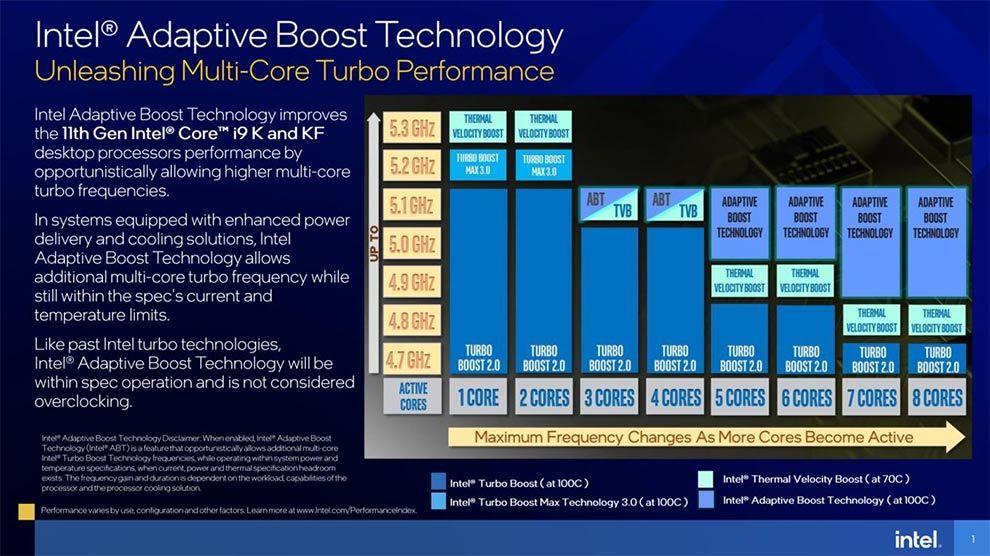
We ran several benchmarks to see how Adaptive Boost Technology would impact the overall performance. We used a 360mm AIO Liquid CPU Cooler to keep the processor as cool as possible. We then ran 3DMark Fire Strike, Handbrake, and a couple of games with and without Adaptive Boost Technology turned on. 3DMark Fire Strike scored 17442 without ABT and 17461 with ABT. The difference was within the margin or error. The Handbrake transcode workload took 12 minutes and 55 seconds with and without ABT. Lastly, we have the video games.
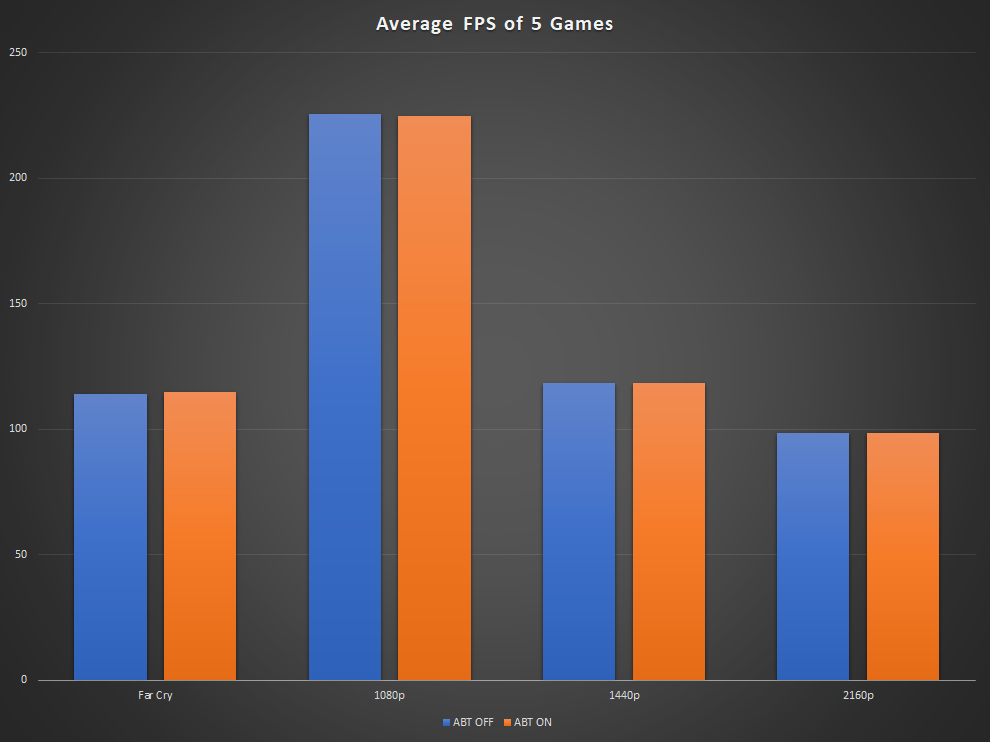
You can see that we had no luck in this set of benchmarks either. The performance with and without Adaptive…
Fuente: Digit
